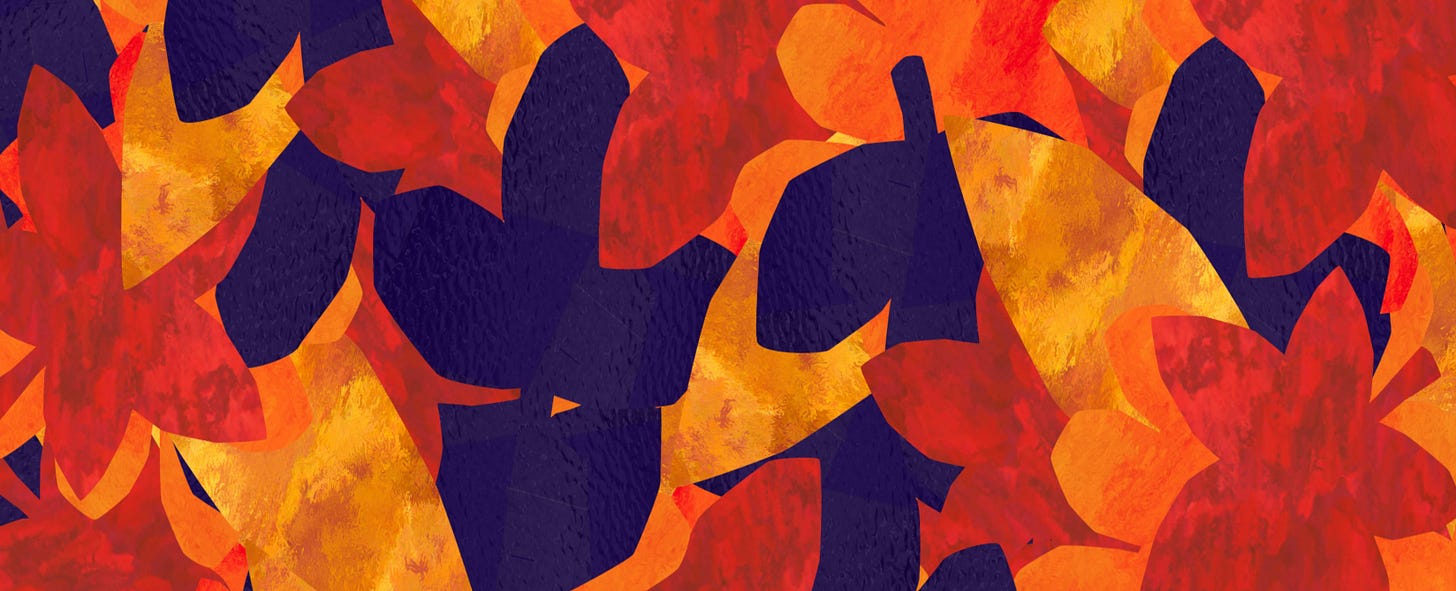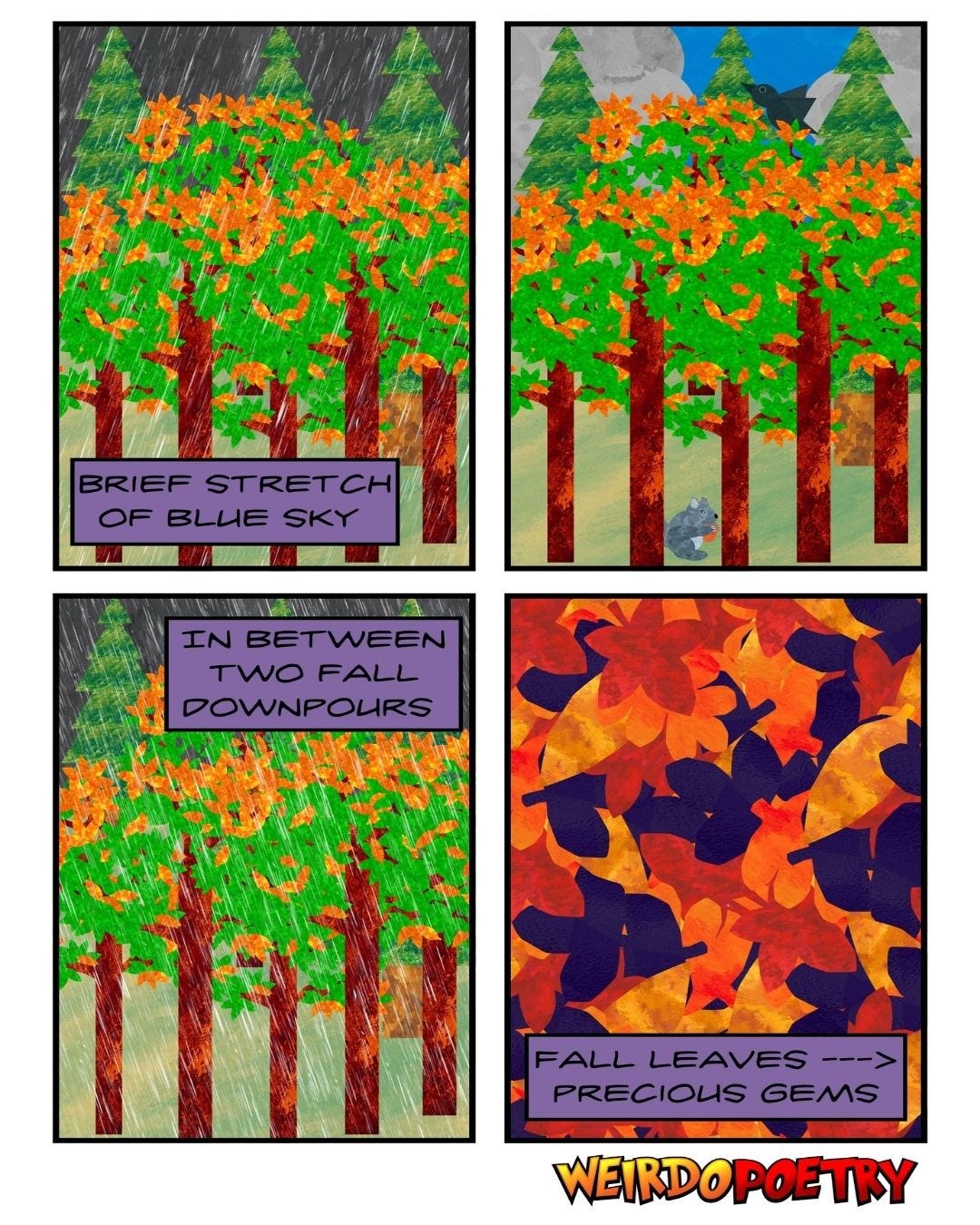Playing Games with Punctuation
Experimenting with tiny details
Hello, Haikuistas!
What happens when you get wild with punctuation while writing haiku?
brief stretch of blue sky in between two fall dowpours fall leaves ---> precious gems
Playing Games with Punctuation
One of the beauties of English language poetry is the freedom you have to play with punctuation conventions and the format of the words. These small marks have the power to transform the way a reader understands your poem.
Because you are not writing a poem for a teacher or grade, and because there are no poetry police looking to cart you away for any poetic infractions, you can use punctuation in whatever way you choose. The only real constraint is your ability to convey meaning to your reader.
When I write haiku, I rarely use periods. My haiku are more sentence fragments than complete thoughts. I also write haiku in all lowercase, except for proper nouns and when I use “I”. Adding. period to a haiku would muddle this convention. However, these are simply my stylistic choices. You could use a period to divide a haiku into two powerful declarative sentences.
I have not yet used an exclamation mark in a haiku, as far as I recall. There’s no real reason other than exclamation marks unnerve me. I use them in emails and on social media to convey my general congenial mood, but I always worry about using too many and seeming unhinged. I avoid them altogether in almost all of my poetry.
I do enjoy question marks in haiku, especially at the end of a third line. Asking a question can draw a reader deeper into contemplation of the poem.
I’m addicted to commas, en dashes, and em dashes. These allow me to introduce space and pauses into a haiku. These punctuation marks also help me show when two things are connected.
But these are just the basics. You have a whole universe of punctuation marks and special characters to use.
With today’s poem, I indulged in using a series of marks to create an arrow. I wanted to introduce a picture element to the plain text. I wanted to convey the idea of leaves somehow transmuting into precious gems. I also love the way the line looks with the shorter phrase “fall leaves” on one side of the arrow and the longer “precious gems” on the other side. Again, to my mind, the arrow suggests some kind of alchemical formula.
Let’s see what happens to this poem when we change the punctuation. First, let’s remember how the poem looked originally:
brief stretch of blue sky
in between two fall dowpours
fall leaves ---> precious gemsHere’s how it would read with an em dash:
brief stretch of blue sky
in between two fall dowpours
fall leaves—precious gemsDoes the meaning change with a comma?
breif stretch of blue sky in between two fall downpours fall leaves, precious gems
What if there were no punctuation:
brief stretch of blue sky
in between two fall downpours
fall leaves precious gemsWhat if we used parentheses?
brief stretch of blue sky
in between two fall dowpours
fall leaves (precious gems)Lastly, what would the poem look like with a question mark and a comma:
brief stretch of blue sky
in between two fall downpours
fall leaves, precious gems?Each change in punctuation changes the meaning of the poem. I don’t think it makes much sense to say one version is better than another version. The key is which version best conveys my intention. And even this concept is fraught because now that I have published this poem it no longer belongs to me. It belongs to you the reader.
For me, the version with no punctuation is hard to make sense of. I feel that just having a comma is safe and boring. The em dash is how I would normally punctuate this haiku, but I was feeling provocative and used an arrow instead. The parentheses are intriguing, but I think they would work better around the second line:
brief stretch of blue sky (in between two fall dowpours) fall leaves ---> precious gems
However, this feels a bit too much.
The version with the question mark is an entirely different poem. It reads like I am questioning the value of fall leaves instead of creating an equivalence between fall leaves and precious gems.
Punctuation not only changes the way readers approach a poem, but it can also change the visual mood the poem conveys on the page. It is another tool in your poet’s toolbox—and the only way to learn how to use it best is to experiment wildly. (Remember the poetry police will not come and take you away for audacious poetry punctuation.)
Haiku Prompt
Write a haiku while being mindful of how you want to punctuate it. Use punctuation as part of the delivery system of your message. Feel free to use the traditional 5-7-5, three-line format, or any other format you want.
Have fun and experiment wildly! Please share your haiku in the comments.
Be the poetry you want to see in the world!
Cheers,
Jason





The sky open...free
to a canvas of delight
Everyone— welcome
I wrote this poem last Friday but I played around with the punctuation. Thank you Jason for this gentle nudge! :)
This is great! Thanks for laying out all the punctuation options. It's really helpful to compare your final form to other punctuation options. You can really see how the arrow is the most impactful, and richly conveys the feeling of the moment. And I like that it's unconventional - I'm not sure it would have occurred to me to use an arrow this way, well done!